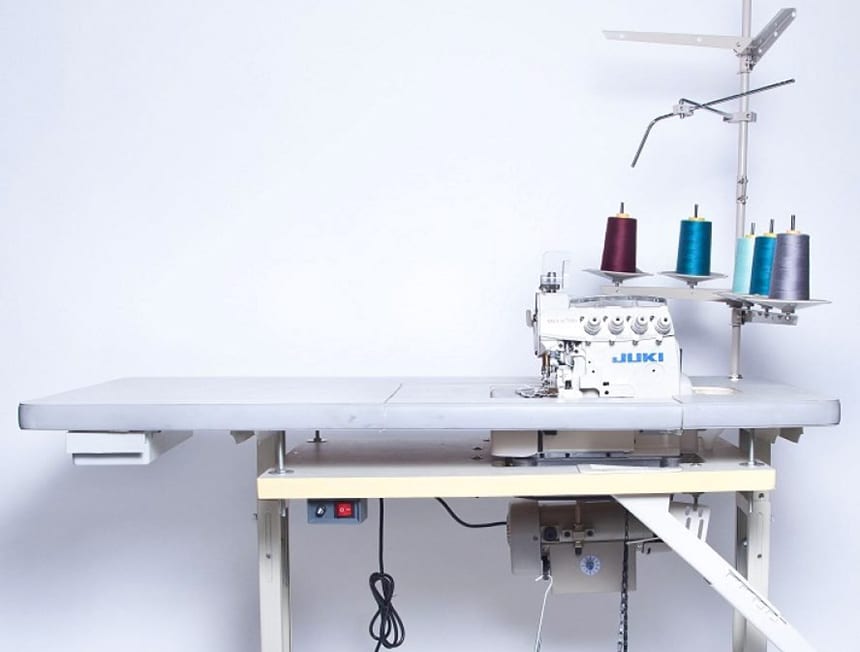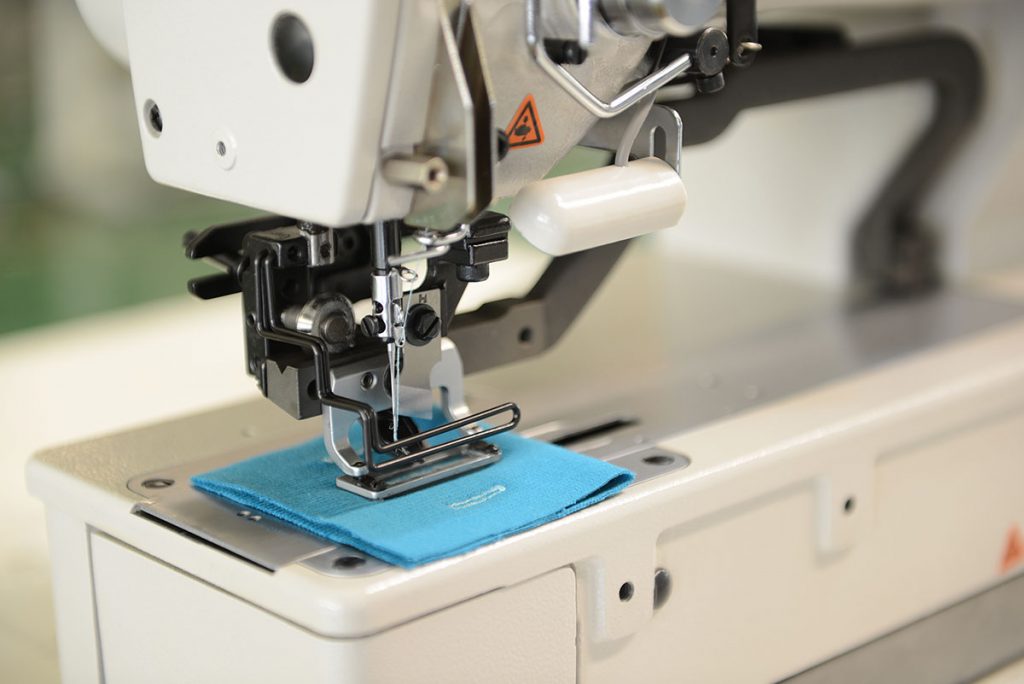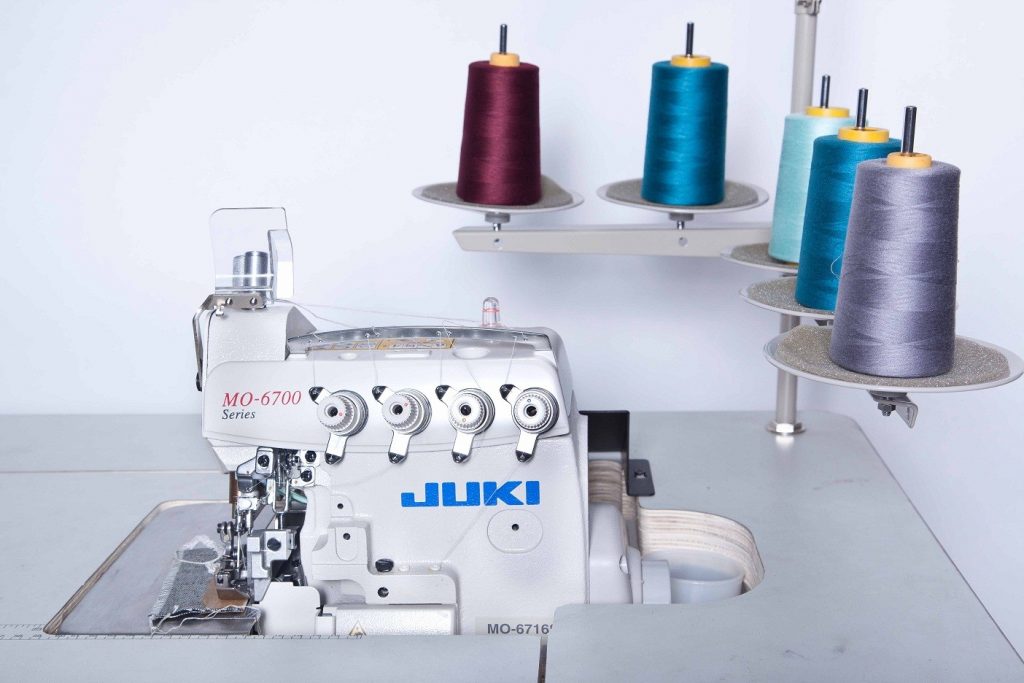

Whether you’ve just gotten into the wide world of sewing or you’ve caught up on the basics and want to get a bit more intricate—especially if you’ve begun to make a profit from your new hobby—the best industrial sergers can give you the very professional seam you’re looking for. A serger, or an overlock machine, is a sewing machine that specializes in edging, seaming, and hemming a large variety of fabrics and products. You’ll most likely see one of these machines in a furniture upholstery factory or a clothes manufacturer.
These industrial level sergers run with speeds from 1000 to even over 9000 rpm, which is extremely fast! Since you can use these kinds of speeds in different businesses, like construction, reinforcement, and decoration, the machines are extremely versatile—making it the perfect go-to machine for any industry. The stitches also stretch with the fabric, making it highly practical with most jobs, locking completely around the seam so that there’s no fraying upon job-completion or in the future.
Don’t have the time or patience to thread a serger? Take a look at this article for the 4 best self threading sergers to save yourself time!
In this article, we’re going to go through our hours of research and present you with some information that can help you pick out the best industrial sergers for your business. From our comparison table to the in-detail reviews of each product—with features outlined, such as sewing speed, stitch length, and the number of needles and threads—to our buying guide, we hope this article helps you pick out the most professional sergers for your situation.
More features: needle-thread take-up mechanism, looper thread take-up mechanism, 7 mm presser foot, automatic lubrication
The JUKI MO-6714S is our best all-around serger. With speeds from 7000 stitches per minute onward, you can definitely rely on this serger to get the job done. The JUKI MO-6714S works with a stitch length of the range being from 0.8 to 4 mm.
It functions using two needles and 4-thread count and is backed by one of the world-leading brands in the industry: Juki.
The JUKI MO-6714S uses 110V with an industrial clutch motor and also operates using a DC X 27 needle. Intended solely for overlock stitching of light to medium weight fabrics, this is the perfect machine to get your one-stop project done and perfected.
With its various features, needle-thread take-up mechanism, looper thread take-up mechanism, 7 mm presser foot, and automatic lubrication, it really is top of its class and on the market. The JUKI MO-6714S is designed to perform at high speed with reliability and consistency, which is perfect for business.
It is also highly versatile, compatible with a wide range of fabric types, from stiff to stretchy. It also comes as a complete unit: with the machine head, table, stand, motor, sewing light, drawer, and all necessary components installed and ready to sew.
More features: 3450 rpm clutch motor, needle-thread take-up mechanism, looper thread take-up mechanism, automatic lubrication
The Juki MO 6716 has everything you need for industrial sewing success. With a fully-assembled table included, as well as a servo motor, you can tackle any project founded on any material.
Tailored and perfected in delicate and beautiful soft-to-the-touch seams, the Juki MO 6716 operates as one of the most silent industrial sergers on the market—delivering skill and quality without all the noise. This reduction in noise also increases the durability and life of the machine.
The Juki MO 6716 comes with a needle-thread take-up mechanism and a looper thread take-up mechanism, you can work on light OR heavy-weight materials while still maintaining flexibility in material elasticity.
The Juki MO 6716 reaches sewing speeds up to 7,000 spm and is also compatible with other conventional Juki machines, which is what makes this brand great. This machine also comes with upper and lower needle bar bushings, which helps enhance the durability of the needle bar unit. It also comes with a cartridge type oil filter and cooling fan.
More features: adjustable stitch width and length, adjustable presser foot pressure
The Brother ST4031HD is an excellent choice for anyone seeking a budget-friendly alternative to an industrial serger. Built with a durable metal frame and equipped with a high-quality carbon steel cutting blade, it handles thick fabrics and multiple layers with ease—making it a strong contender for heavy-duty sewing at home or in a small workshop.
Unlike lighter consumer models, the ST4031HD is designed for reliability and stability, offering up to 1,300 stitches per minute for fast, professional finishes. Sturdy AND consistent!
Its 3- and 4-thread overlock capability makes it versatile for a range of projects, from garment construction to upholstery, while the wide table attachment ensures smooth fabric feeding, even on bulky materials. Despite its rugged performance, it’s still user-friendly, featuring color-coded threading guides that simplify setup.
For sewists who want industrial-like power without the steep cost or size of a full feature industrial serger, the Brother ST4031HD strikes the right balance. It’s affordable, tough, and dependable—ideal for budget-conscious professionals or hobbyists who demand more than an entry-level machine can deliver.
If you’re looking for the an industrial level serger, this buying guide can help you focus on the side-by-side features of each of the products listed above. We hope that our buying guide helps you sew through the ins and outs of sergers so you are well-informed before you buy.
Whether you work construction, manufacturing or in the clothing industry, the seams produced by the best industrial sergers are not only flawless and seamless, they stretch out so much more than the conventional sewing machine seam.
Especially when you are working with knit or other stretchy fabrics, you’ll definitely be able to benefit from it. Whether you want to finish seams, create special hems or lay out edgings, an industrial level serger can definitely be what you’re looking for and what your business may need.
Whether you are multi-million dollar corporation or a startup business, finding the right serger for you can come back down to the small details. Each feature in these sergers can make the ultimate difference between the perfect pick and a sewing disaster.

Take a look at these features to help you pick out which are most important for you:
This where most of the sergers will differ from one another. There are so many options available in the industrial sewing machines on the market. However, sorting out what you need is as simple as figuring out the ideal speed.
You will be able to choose from:
 The main advantage to a serger is that they sew fast. However, quality responsive foot control is what truly makes a difference—this will actually be able to help you slow the job down when you need to and control the speed with much more precision.
The main advantage to a serger is that they sew fast. However, quality responsive foot control is what truly makes a difference—this will actually be able to help you slow the job down when you need to and control the speed with much more precision.
Industrial sergers will have a speed control lever on the head of the serger, which will be easy-to-use and computerized on most models
Sergers are also highly beneficial on bursts of speed, which can normally be controlled by the foot-control, meaning that feature is definitely a must in an industrial serger.
The overlock stitches are normally identified by the number of threads. Normally, they go from 1-5.
When you’re working with a 1-thread, you should be focusing on end-to-end seaming or “butt-seaming” with textile material.
When you’re working with 2-thread—which is the most common—you should be focusing on edging and seaming with knits and wovens. You can also stitch flatlock, elastic, lace, lingerie, and hemming.
When you’re working with 3-thread you should be focusing on sewing pin tucks, narrow-rolled hems, fabric edges, edging, and seaming with knit or woven fabrics.
When you’re working with 4-thread, like the Juki MO-6714S, you should be focusing on edging, finishing, seaming high-stress areas, and needing flexibility with strength.
When you’re working with 5-thread, like the Juki MO-6716, you should be focusing on apparel manufacturing and safety stitches.
 The needles are also an important part of an industrial serger. Of course, you’ll want to make sure that you are using what the manual of the product recommends—like the Industrial Standard Sewing Machine Needles. Especially since the machine gives off a lot of heat and wears down on the needle, the industrial speeds can break the needle and possibly the machine.
The needles are also an important part of an industrial serger. Of course, you’ll want to make sure that you are using what the manual of the product recommends—like the Industrial Standard Sewing Machine Needles. Especially since the machine gives off a lot of heat and wears down on the needle, the industrial speeds can break the needle and possibly the machine.
You’ll want the machine to last as long as it can—especially if you are investing in an industrial serger for your business. Check the reviews of previous buyers to see how long it has lasted while working regularly. You’ll also want to check the warranty behind the serger, even our budget pick, the Yamata FY747A has a 1-year warranty on the motor.
After all that’s said and done, you might end up with a pretty high-quality industrial serger. But what else is there?
Some additional mechanisms included within the industrial level serger are differential-feed micro-adjustment mechanisms and external adjustment mechanisms. These are used for changing up the feed dog incline and also raising the differential feed ratio. This will help match the speed with the material.
A micro-lifter feature can also help improve the responsiveness to materials and reduce the operating noise and vibration.
As we mentioned before, the warranty is extremely important—as it is with any electrical machine. Although not stated here for the other two industrial sergers, the Brother ST4031HD comes with a 1-year warranty on the motor and a 6-month warranty on the head.
You should be oiling your machine every 4-6 months. Normally, the manual will come with specific how-to directions since each machine is different. You’ll also get to know your machine after a while.
On the industrial serger, you’ll want to focus on oiling the looper shaft at the two points where they are most dry.
Once that is done, unthread the needle, let the presser foot lift up and then gradually bring the thread through the channels, which should be running from the bottom.
Wait until the knot feeds through. Once that’s done, you can clip it and then rethread, using a reading direction—from left to right. The thread tail of the bobbin should form a “9” before inserting it into the bobbin case to keep it straight.
Since we only have three products to work with here, we’ll give you a quick recap of our industrial serger review—our best industrial sergers are:
The Juki MO-6714S tops our list of the best industrial sergers. It not only reaches speeds up to 7000 stitches per minute, but you can also work with the 4-thread count, making it extremely versatile. Backed by one of the world-leading brands in the industry, it comes with a variety of features including a needle-thread take-up mechanism and a looper thread take-up mechanism, as well as a 7 mm presser foot and automatic lubrication.
The Juki MO-6716 is one of the quietest industrial sergers around. Although it is minuscule in noise, it is grand in power—with a sewing speed equivalent to our best all-around serger, at 7000 spm. The Juki MO-6716 also comes with five threads, which is the highest number of all three of our sergers, allowing for much more versatility in your projects. It also features a 3450 rpm clutch motor, needle-thread take-up mechanism, looper thread take-up mechanism, and automatic lubrication.
The Yamata FY747A is our best budget pick for industrial sergers. Regardless of affordable price, it still has a sewing speed of 6000 spm and a 3000 rpm servo motor. The Yamata is also backed from the manufacturer with a 1-year warranty on the motor and a 6-months one on the head.
Whether you’re picking from one of our top three choices or have gone with your own, we hope that this article has broadened your options and given you the guidance you may need to narrow down your search. Our guide should have helped you pick out the best industrial serger for you and your business—please let us know if you have any more questions on this matter! We wish you happy sewing!
Would you know if the Juki MO 6714S that you used had a clutch or servo motor? I’m just wondering why it was noisy. I’m on the hunt for something that can handle 8+ hours of daily serging while staying quiet enough not to disturb the neighbors in my little apartment.
Hello, Liz. The Juki MO 6714S serger has a servo motor and it should deliver a quiet performance if set right. Various problems with the noise might be caused by an unstable slate settlement due to poor tuning. It can be fixed by applying thicker grease to the inner gears.
If anything, there’s an option of Juki MO-6716, that is fairly quiet compared to the rest, but won’t really be a soundless device, so you might want to warn the neighbors about the slight noise.